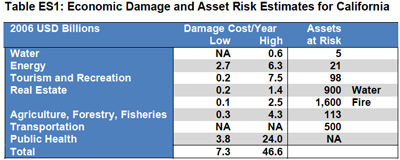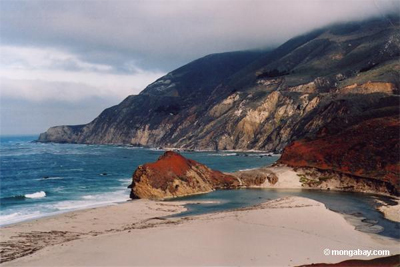Climate change will cost California billions
mongabay.com
November 14, 2008
|
|
$2.5 trillion of real estate assets in California are at risk from extreme weather events, sea level rise and wildfires expected to result from climate change over the course of a century, according to a new assessment from UC Berkeley researchers.
The report, California Climate Risk and Response, estimates that climate change could cost the state $300 million to $3.9 billion per year in damages to real estate depending on its severity. In addition to real estate, California could incur tens of billions per year in direct costs, and even higher indirect costs, from the impacts of climate change on water, energy, transportation, tourism and recreation, agriculture, and public health.
 Economic Damage and Asset Risk Estimates for California (courtesy of “California Climate Risk and Response”)  California coastline |
The report argues that efforts to slow greenhouse gas emissions will not only protect California’s asset base, but create new opportunities for economic growth.
“As we learned in New Orleans, turning your back on the threat of natural disaster doesn’t make it go away,” said co-author David Roland-Holst, an adjunct professor at Berkeley. “We also know from history that decisive policy can turn adversity into economic renewal. WPA, the Marshall Plan, the Space Race, and even Homeland Security transformed threats into employment and growth. We can ignore change that is already happening or we can turn the threat of climate damage into a dynamic opportunity for change, renewal, and growth.”
“The scale of climate risk over the coming decades dwarfs today’s financial crisis and will long outlive it. As the current market turmoil proves – markets may deliver profits, but not sustainability. It is up to responsible leadership to protect the public interest,” added F. Noel Perry, Founder of Next 10, a California policy think tank.
“We are already seeing the impacts of rising temperatures. Not only governments, but every enterprise and household needs to evaluate their economic vulnerability and begin adaptation now,” said Roland-Holst. “As Charles Darwin said, ‘It is not the strongest of the species that survives, nor the most intelligent, but the one most responsive to change.'”
Fredrich Kahrl and David Roland-Holst. California Climate Risk and Response. DEPARTMENT OF AGRICULTURAL AND RESOURCE ECONOMICS at the UNIVERSITY OF CALIFORNIA, BERKELEY. November, 2008
RELATED ARTICLES
Warming will trigger cycle of increased energy use, heat waves in California
(7/11/2008) As the 21st century progresses, major cities in heavily air-conditioned California can expect more frequent extreme-heat events caused by climate change.
California plan would cut emissions 30% by 2020
(6/27/2008) California announced a plan to reduce state greenhouse gas emissions by 30 percent by 2020.
Global warming threatens California’s native plants
(6/24/2008) Two-thirds of California’s native plants could suffer an 80 percent or more reduction in geographic range by the end of the century due to changing climate warns a study appearing tomorrow in the open-access journal PLoS ONE.
Globl warming worsening U.S. water crisis
(1/31/2008) Human-induced climate change is accelerating a water crisis in the American West, reports a study published this week in the journal Science.
Climate change already affecting water supplies in the Western U.S.
(12/11/2007) Climate change is already impacting water supplies in the western United States and is likely to reducer carbon sequestration by regional ecosystems, reports research presented at the fall meeting of the American Geophysical Union in San Francisco.